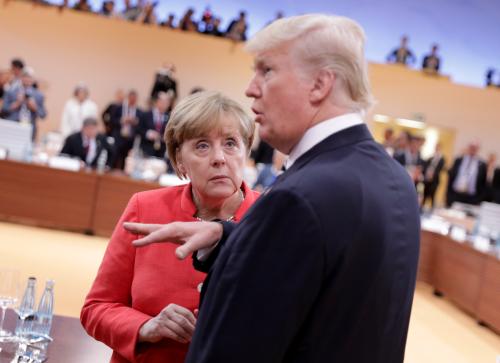Where does an “America First” foreign policy leave Europe? On May 24, German Chancellor Angela Merkel was in Beijing, French President Emmanuel Macron was in Moscow, Italy was on the brink of major political drama, and Brookings convened a public discussion on the topic in Washington as part of the Brookings – Robert Bosch Foundation Transatlantic Initiative. Edward Luce of the Financial Times moderated a panel, which included Brookings Robert Bosch Senior Fellows Amanda Sloat and Constanze Stelzenmüller and Visiting Fellow Célia Belin, as well as Hudson Institute President and CEO Kenneth R. Weinstein.
ON TRUMP’S APPROACH
Luce asked Weinstein how he dealt, as a conservative, with U.S. President Donald Trump’s unorthodox policies and what advice he would give to Europe. “The understanding one has to have of [Trump is] that he comes in as an outsider willing to ask questions,” Weinstein argued. “To his credit, he at times comes up with bold policy options that can change the equation.” Weinstein argued Trump was “actually very straightforward,” keeping his word on leaving the Iran nuclear deal, moving the U.S. embassy in Israel to Jerusalem, revisiting terms of trade, and negotiating North Korea’s denuclearization.
Weinstein contended that Trump’s record was not “weak” on Russia and that the U.S. commitment to NATO was clear, but submitted that NATO summits “will focus on probably second tier level issues rather than major issues where there could be huge divides and room for uncertainty.” He argued Europeans could work with the administration if they thought creatively, and suggested collaboration on WTO reform, a priority for U.S. Trade Representative Robert Lighthizer.
EUROPE’S RESPONSE TO TRUMP AND THE TRANS-ATLANTIC DIVIDE
Other panelists were more concerned about the state of affairs. Stelzenmüller argued that trans-Atlantic discord over ends, rather than means, was new. “We’re disagreeing about what relationship we want to have with the world, whether globalization is a fundamentally bad thing or a good thing whose negative implications need to be managed,” she said. And she raised Trump’s expressed contempt “for the most foundational principles of American Constitutional order” and lack of respect “for the decent opinion of mankind” as novel in an American president as well.
Sloat recalled being told by an EU official that Europe’s policy was “to engage with the U.S. in areas of shared interest, to be vocal where there are areas of disagreement, and to stay true to values”—a description which echoed how she used to describe U.S. relations with Turkey as a State Department official. “I used to say to people that it is a danger to look at bilateral relations through the singular person of the president,” she said. “In the same way Erdoğan doesn’t represent everybody in Turkey, it’s also true that Trump does not represent everybody in America.” Stelzenmüller responded that despite strong economic and subnational ties between America and Europe, foreign and security policy problems had to be dealt with by the capitals—“the Mayor of Chattanooga isn’t going to cut it.” And despite the presence within the executive branch of officials sympathetic to European concerns, Trump “has increasingly surrounded himself with people who are capable of weaponizing his attitudes.”
Luce pointed out that when Macron and Merkel visited Washington last month, trying to sway Trump to stay in the Iran deal, “one of them flattered him” and “the other didn’t,” but neither approach seemed to work. Belin said that the Europeans were starting to realize that “the United States has pushed for an era of competition… not only with rivals, but also with allies.” The U.S. exit from the Iran deal marked a belated moment of realization that “the interest of European allies will not be taken into account,” she argued.
Belin saw Trump’s policy decisions as “about U.S. domestic politics first and foremost,” and said Trump excelled at what she called “the hot potato technique… creating burning hot situations and passing them on to rivals and partners to deal with.” At some point, she argued, “there needs to be a recognition that there is no point in negotiating when you already know the ending.” Belin argued that Macron’s “too clever by half” approach to Trump was costing him political capital in France but he was trying to keep his European priorities from being “hijacked” by a trans-Atlantic fight.
Sloat recalled the similar trans-Atlantic divisions over the Iraq War 15 years ago. What is different this time around, she argued, is that in the absence of “genuine American global leadership,” other countries would fill the vacuum. “The analogy that I’ve used is like the high school boyfriend who goes off to college for four years and then he reappears on your doorstop and is like, ‘Hey, I’m back.’ It’s like, well, my life has moved on in four years.”
GERMANY FIRST?
Sloat described Europeans as having “a tendency to develop their foreign policy either in support of or in opposition to what the Americans do.” She argued that the European Union becoming a stronger actor on the world stage with “a much more singular and coherent foreign policy” could be a silver lining to the current situation. She noted, however, that Europe’s “growing internal ruptures” would make this challenging.
Luce turned to Stelzenmüller, asking if the new German government’s debt targeting and reticence on defense spending wasn’t “a way for Europe to take destiny in its own hands,” but “a strategy for Europe to fragment.” Stelzenmüller argued that “capability and power differentials in Europe” were immense and growing, putting “an onus of responsibility on Germany that it is currently not carrying”—for additional defense spending and for “a more expansionary policy for the eurozone and for growth and reducing unemployment in Europe’s south.” She called for Merkel “in the twilight of her long rule” to rally German citizens to rise to the challenge. Noting that Chancellor Kohl had drastically downplayed the cost of German unification, now “20 billion euros and rising,” Stelzenmüller was blunt: “Let us not kid ourselves, it is going to cost us and it will cost a ton, but, you know what, the alternative to not doing it is horrific, and we will regret it for the rest of our lives if we don’t do this. And so it will be worth every cent.”
The Brookings Institution is committed to quality, independence, and impact.
We are supported by a diverse array of funders. In line with our values and policies, each Brookings publication represents the sole views of its author(s).






Commentary
Trump and the trans-Atlantic divide
May 31, 2018